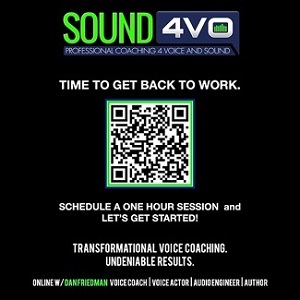|
BUSINESS Keep Cash Flowing: How To Deal With Slow-Pay And No-Pay Clients  By Maxine Dunn By Maxine DunnVoice Actor and Solopreneur One of the mainstays of a successful voice over career is a healthy cash flow. And that doesn't just mean you want to be making a profit, it means the cash needs to FLOW: Money needs to be flowing into your business on a regular basis.
If you have three or four clients who owe you several thousands of dollars each, and they're all 60 or 90 days past due, that could spell real trouble for your voice over business.
THE SOLUTION IS WITHIN YOU
Before I get into the details of how to prevent and handle slow-to-pay or no-pay clients, it's important to address your "mindset" surrounding this issue.
If you're having trouble collecting payment from a client, it can sometimes signal a deeper problem than just an obstinate customer. It can have to do with your confidence.
Sometimes you'll discover that your mindset or lack or confidence is exacerbating the problem.
THE BRIGHT SIDE ... On a positive note, there is an upside to having a slow-to-pay client.
It can highlight the weak links in your business model that you can then address and improve. And it can encourage you to change or reinforce policies that you may have allowed to become too flexible due to familiarity or the passage of time.
FIX YOUR BUSINESS POLICIES
If you're having trouble getting paid, take a good hard look at your:
Remember, any problem in your business is always an opportunity for growth!
So let's look at the two sides of the slow-to-pay client coin, shall we? One side is how to prevent a client from getting into arrears in the first place. The other is how to collect the money that's owed to you.
AVOIDING SLOW-PAY PROBLEMS
Preventing a slow-to-pay situation:
1. Have crystal clear terms of engagement before you begin any work, and make sure the client agrees to your payment policy and confirms in writing or in an email that they agree to your terms.
2, The very best policy is to always get payment in advance or at least a 50% deposit in advance.
3. To protect yourself from the client who justifies withholding payment because "we haven't been paid by OUR client yet," make sure you make it clear you're contracting with them to deliver work for payment for them, not their end-user client. In other words, if you're hired by a production company to record their audio, you should not have to wait until the advertising agency pays them, to get paid.
4. Don't release the finished audio until the client has paid in full. Make it easy for them to pay: PayPal, credit card, or overnight check. Make sure you let them know this payment policy BEFORE you record the job.
5. Suggest that your client set up an ACH (electronic deposit) payment agreement for you. All they'll need is your checking account number and bank routing number in order to transfer money directly into your checking account quickly and easily.
6. Refrain from doing business with clients who try to convince you to significantly lower your fees or who will only hire you based on how "low" your fee is. Price shoppers and clients who don't value you are notoriously slow-to-pay.
GOING AFTER SLOW-PAY CLIENTS
Collecting money from a slow-to-pay client:
1. Send your invoice promptly after work is finished, and if their payment is even one day late (past your payment terms) follow up the very next day with another copy of the invoice.
Include a friendly note: "In case this was overlooked, attached is a copy of invoice #1234 that was due on July 31, 2012. Thank you kindly for your payment." 2. If the payment is past 30 days, continue to send your monthly invoices, but also call and speak to your client in person instead of only contacting them via email or regular mail. Don't leave a message. Keep calling until you get them on the phone.
If after several calls you're unable to get your client on the phone, ask the receptionist who you could speak with about the invoice; for example, accounts payable or the controller. Make every attempt to speak with someone in person about the past due invoice.
3. Send your invoice via FedEx to your main client contact, accounts payable, or even the CFO. Include a friendly but firm letter requesting payment. You can also explain (briefly) that cash flow is vital to your business and you are unable to carry this unpaid balance any longer. Include an SASE. Remember many times the squeaky wheel gets the oil.
4. When speaking with your client, accounts payable, controller or CFO, offer to stop by in person to pick up a check or, if they’re in another city, have a courier service pick up the payment for you. Then have the courier service mail the check to you. (Typical courier charges are $30.)
5. If you'd like to continue working with this client and are willing to help them during a slow-to-pay period, suggest a payment plan to bring the unpaid balance up-to-date. Refrain from accepting further jobs until the balance is paid. Once the outstanding balance has been paid in full, request all future payments in advance.
6. Add to the invoice (in red ink) that if payment is not made by a certain date, unfortunately you will have no choice but to refer their account to a collection agency. Gentle (not nasty), firm persistence pays off.
AN EXTREME OPTION
Of course, it's possible to threaten small claims court and additional charges, however give these less extreme strategies a try first. Not all at once!
Try to speak to someone in person as much as you can. It's easy for people to ignore emails and voice-mail messages.
If you're worried about alienating a client or burning a bridge because you're pursuing payment, ask yourself if that's really the kind of client you want - and if chasing down payments from slow-to-pay or no-pay clients is the best use of your time or energy.
WHEN TO LET GO
If months have passed and it's obvious the client is not going to pay you without a lengthy legal battle, consider letting it go. Consider forgiving the debt, learn from the situation, and move on.
If the situation involves a very large sum of money, this may, of course, not be acceptable to you, but consider the time, energy, expense, and detriment to your mental state and productivity a protracted collection process can cause.
Carefully weigh how much continuing to try and collect your money will cost you on a personal level. Collecting payment from clients who are dragging their feet or refusing to pay is never fun and rarely easy.
However, reassessing your payment policies for the future while firmly persisting to collect the money that's owed to you now can put you in a much better position moving forward.
-------------------- ABOUT MAXINE Maxine Dunn is a top voice over artist and on-camera spokesperson who has been seen and heard in hundreds of commercials, documentaries, corporate narrations, voice-mail systems and websites. She is a British native and her ability to also deliver a perfect American accent gives her business a wide range. She works with Fortune 100 companies, award-winning creative teams, and maintains an extensive clientele - locally, nationally, and internationally. Best known for her voice over and spokesperson expertise, she is also an avid writer who enjoys bringing stimulating and motivating material to her readers. Her free weekly e-zine, The Creative Business Advisor, is available at her website (below). Web: www.maxinedunn.com. Email: Maxine@maxinedunn.com. Complimentary newsletter sample: http://bit.ly/MaxineNLsample |
|
|
For essential voice-over business strategies
On Michael Langsner's Voice-Over Roadmap Podcast
Inspiring interviews help your VO career
With Sean Daeley and Paul Stefano - check it out!
As of the NEW website launch, 03/22/2012


.png)







xox
Maxine
Bettye Zoller
(Just taught at Univ. of New Orleans LAST week...lucky huh? Blessings to all my NOLA students and stay safe.)